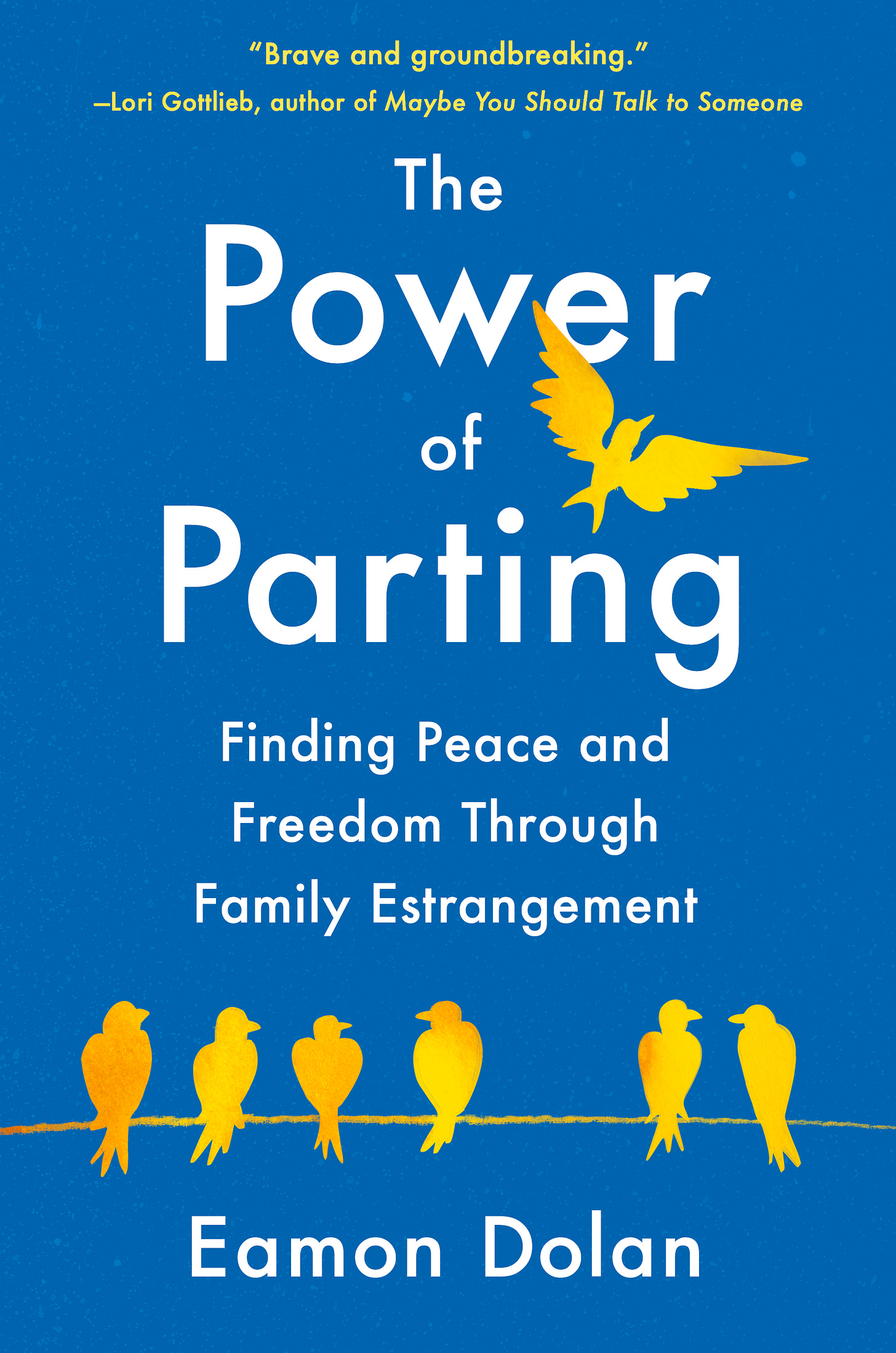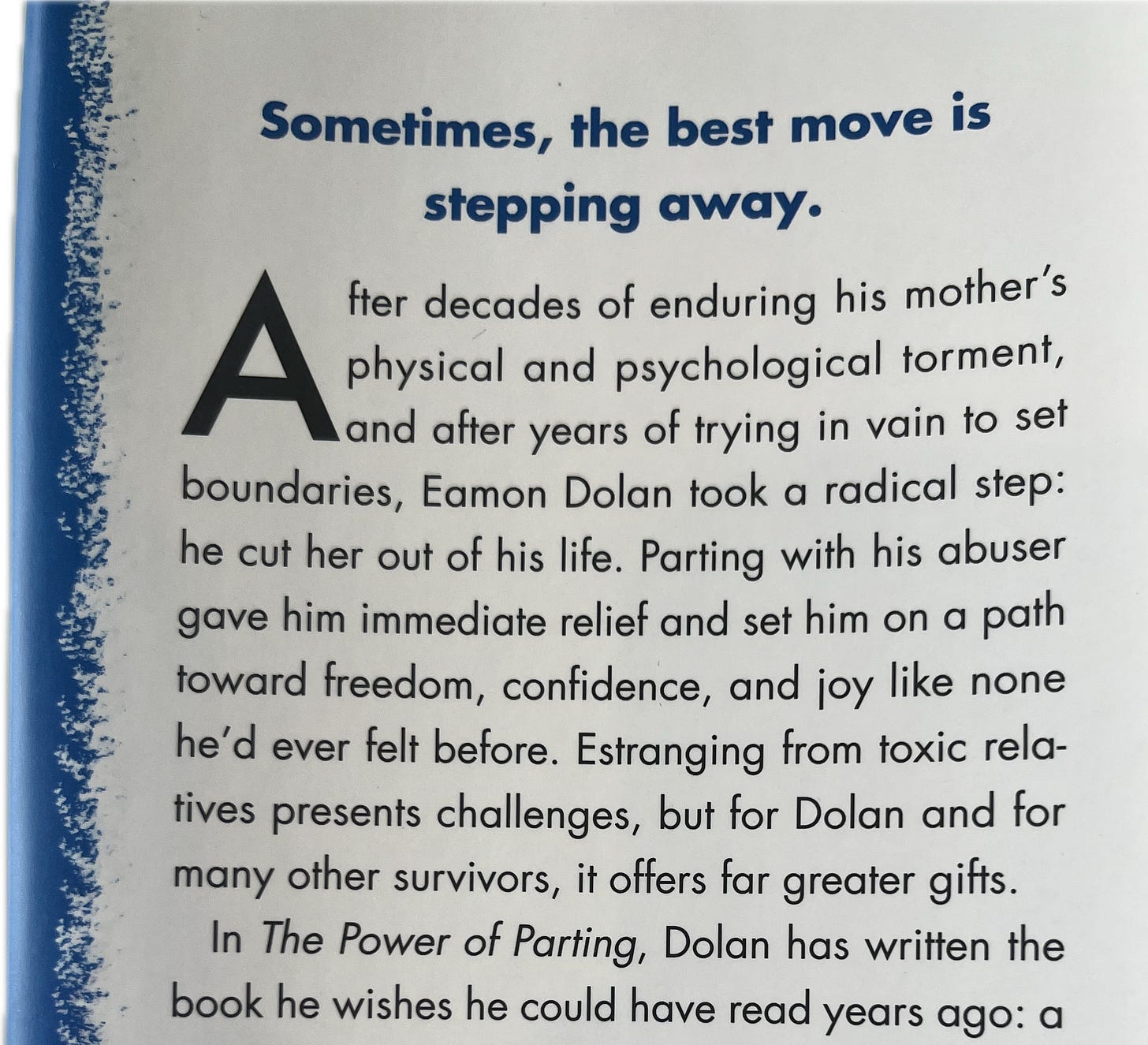The Power of Parting
A new book that finds freedom through family estrangement
I have so much to say about this book that I decided I’m going to divide my review into two parts. This is Part 1.
The Power of Parting by Eamon Dolan was just released April 1. Dolan is not a therapist, researcher, or a journalist. He’s a book editor. He’s also the survivor of physical, verbal, emotional, and psychological child abuse at the hands of his mother. In adulthood, he chose estrangement from her and immediately, his life improved. When she died he hadn’t spoken to her for years, and he had no regrets about the estrangement.
He’s certainly not an “evangelist” for estrangement in the sense that the book pressures people to choose cutoff. But, Dolan gives voice to people who, like him, have chosen cutoff and in doing so, improved their lives. Dolan argues that there are plenty of people like him, people who saved their sanity and maybe even their lives by ending contact, and that they need not feel ashamed, nor do they need to have a plan or even a hope that someday they will “reconnect.”
That’s the main thesis, and to support it, Dolan spends the beginning of the book pushing back against the idea that family reunification is always the goal for people in estranged familial relationships. He points out how our whole society is geared around keeping families together.
As Dolan says in his introduction, “It’s not just our culture…. The law conspires against victims, too.” (He does undermine some of his arguments about the failure of psychiatry and psychology by citing Bessel Van der Kolk and Gabor Maté extensively.1)
Still he makes an effective point that interventions from therapy to family court prioritize family reunification and reconciliation. “While therapists are taught a range of techniques for fostering reconciliation among family members, they learn little about how to help their patients move away from toxic relatives.”
‘Do I deserve anything?’
One of the most striking sections of the first half came for me in Chapter 3, “The Long Tale,” where Dolan describes how even after years of therapy, he believed that while it might be true that he didn’t deserve the open abuse his mother had inflicted on him for his entire childhood, it was also true that he didn’t deserve much beyond… existing. He shares a scene where his therapist ask about why he doesn’t celebrate his birthday.
“We never really celebrated birthdays when I was young, and, frankly, it feels like an arbitrary sort of celebration,” [Dolan says to his therapist]. “Why do we need to celebrate ourselves at all? I grimaced and muttered with disgust, “God, it’s so egotistical!”
[His therapist replies], “So, everyone else is wrong to celebrate their birthdays? What about your friends? What about [your son] Oscar?”
“That’s different!” I declared irritably.
Gently, she pounced. “I think what you’re really saying is that you’re different.”
I found this section particularly insightful because the issues in an abusive, conflictual parent-child relationship aren’t just about conflict with the parent. They are also about a lasting internal conflict that the adult child is left with which boils down to: Do I deserve anything? In this way, Dolan highlights that the issue isn’t just that a parent is “mean,” or that the adult child is just capricious or lazy about maintaining the relationship.
Better communication is not enough
The Power of Parting also bucks a superficial narrative around estrangement that tells us that better communication will fix things. In the dominant narrative, the idea is that one or both of the estranged people is somehow “holding back,” and if only one of them would “be the bigger person,” by being the first one to say how they feel and hold out an olive branch, the conflict would melt away.
Overall, Dolan is impatient with this narrative that has nothing to do with his experience. In Chapter 5, “Making the Break: How to Part,” he proposes an assessment about how to decide once and for all if the relationship can be salvaged. This assessment is not so much giving them “one more chance,” as it is a way to help the reader see that their relative can’t or won’t act differently, even when they receive very explicit feedback about how hurtful they are.
Many of us have faced this moment over and over. It’s the moment when we realize we only have two options: either to put up with unacceptable behavior or to limit or cut off contact. No matter how much we wish for and long for the third option—that they see our point and choose us over their rigidness—it’s not going to happen. Dolan’s method in Chapter 5 is meant to help the reader realize this.
The main criticism I had after I finished the first half of The Power of Parting is that although it’s very empathetic to people who have had to choose estrangement, Dolan doesn’t examine one very important assumption: the idea that estrangement always results from abuse.
Dolan works from a broad definition of abuse that includes physical, sexual, emotional, verbal, and psychological. The book’s thesis rests on an idea that every estrangement is a choice to step away from a relationship that is always abusive in at least one of these ways. The book’s narrative is rooted in his personal experience: Dolan’s mother Teresa physically and psychologically abused and terrorized her children. For Dolan, the abuse led to the estrangement. But is this the case for every adult child that chooses estrangement from a parent, or for everyone who chooses sibling estrangement?
I was left wondering whether applying this narrative exclusively—abuse that leads directly to estrangement—oversimplifies estrangement.
Not only that, it also reinforces the idea that the person choosing cutoff needs to justify their choice, the everyone needs to be able to point to clear abuse. But what if the person choosing cutoff didn’t suffer abuse? What if the relationship is “merely” intolerably draining or frustrating? Are those people not justified in choosing estrangement? Do queer adult children who grew up with warm, loving parents who also embrace Trump and hate LGTBQ people not “deserve” to choose cutoff? Or, in Dolan’s rubric, is the parents’ bigotry a form of abuse?
Just as marriages don’t always break up if and only if one partner is abusive, familial estrangement doesn't always happen if and only if one family member has abused another.
I hesitate to compare estrangement to divorce because the power dynamics of a parent-child relationship in particular are so different from a marriage. But if the cultural conversation about estrangement remains narrowly defined by estrangement only occurring as a result of abuse, we are going to leave out a lot of relationships and hamper our understanding of why estrangement happens and, important, what it signifies in our culture.
In my essays here, I tend to push back on the idea that the person choosing cutoff should feel pressure to justify their choice to anyone. For all of its thoughtful consideration of the person choosing estrangement, The Power of Parting did not push back on this pressure.
That said, I recommend The Power of Parting anyway. There is plenty that makes it worth reading, especially if you keep in mind these questions while reading it, as I did. Is estrangement only justifiable if it occurs as a consequence of abuse? If a parent is causing a child distress by being selfish, emotionally immature, or impossible to please, is that abuse?
And finally: Does a person choosing cutoff need to justify their decision by pointing to a particular form of abuse they suffered?
PS: Wait til you hear what Dolan has to say about forgiveness! But I will save that for Part 2.
If you’re curious about why these two are problematic, here are some references. https://www.motherjones.com/media/2024/12/trauma-body-keeps-the-score-van-der-kolk-psychology-therapy-ptsd/ and this video about Dr. Maté




I so appreciate your questions Maggie! There is not a right or wrong way in so many situations and I love how you can keep pointing us to our own vast grey areas. 🪩
I appreciate this nuanced assessment of the book. Looking forward to Part 2!